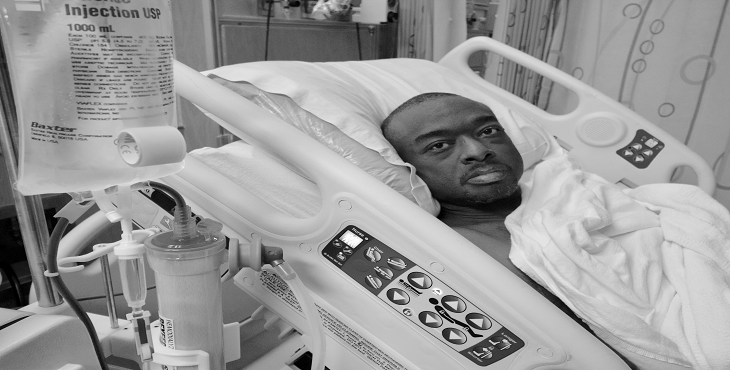Glen Davis can be found eating lunch with his wife, LaShun, every Monday through Friday, at the Dallas VA Medical Center, rain or shine.
In fact, Davis spends about 35 hours per week at Dallas VA Medical Center. He is not an employee, nor a volunteer—he’s much more than that. To the staff and the many Veterans who work and use the Dialysis and Spinal Cord Injury clinics, Davis is family.
Davis, a Texas native, served as a combat engineer in the U.S. Army from 1989 to 1995. During his time in uniform, he served at Fort Hood, Texas, in Germany and was an attached member of the storied Big Red One, 1st Infantry Division, during Operation Desert Storm. Davis joined 12,000 fellow soldiers and 7,000 pieces of equipment in spearheading the armored attack into Iraq that enabled the critical breach of Iraqi defenses.
“It was a great group of guys trying to stay warm and survive,” said Davis. “We were definitely like a family that took care of each other.”
In what would become Davis’ last year of military service, leg and knee pain coupled with frequent swelling derailed the opportunity to continue on as a combat engineer. A subsequent medical discharge led to an opportunity with the Texas Department of Criminal Justice near his hometown and family. Unfortunately, a subsequent systemic lupus diagnosis and a spinal tumor took away much of Davis’ mobility and caused kidney failure.
“My body just decided to shut down,” said Davis. “I was scared. My family was scared.”
Confined to a wheel chair, Davis has surrounded himself with various people at Dallas VA. Because of the lupus-nephritis, he must undergo four hours of dialysis, three days per week, in addition to continued rehabilitation in the SCI clinic, twice per week. But Davis is in good hands. In fact, Dallas’ dialysis clinic is the largest in the entire VA system. On a typical day, the clinic will see at least 80 patients over two shifts.
Creating surrogate relationships with staff and his fellow Veterans has served Davis well during the thousands of trips and hours at Dallas VA over the last 16 years.
“I treat dialysis like a part-time job,” said Davis. “I know I have to get up each morning and do what I need to do to keep living. I do it for me and for my family, as family is everything.”
For the clinicians, specialists and support staff that administer life-saving treatment to their 80 patients each day, their efforts are much more than just a list of tasks.
“If they come to our clinic, it’s very serious,” said Nasreen Parupia, dialysis unit clerk. “It’s tough for them to come three times per week for a lifetime. Knowing this, we remain positive and look at them as more than just a patient.”
Davis is perhaps the longest tenured patient in a dialysis unit that has several regular faces. Adding familiar faces to the procedure helps recreate the bonds that Davis and many other Veterans formed during their time in uniform.
“Having these fellow Veterans around when I’m in dialysis makes it easier. We’re like one big family. If we lose someone from the group, we feel it,” said Davis.
Davis doesn’t limit his relationships to just surrogate families comprised of dialysis, SCI staff and his fellow Veterans, his wife, LaShun Davis, also works at the Dallas VA as a nursing assistant in mental health, where she spends her days helping Veterans like her husband.
Glen Davis is an active member of Paralyzed Veterans of America where he enjoys regular trips with other Veterans to fishing tournaments, bowling events, speaking engagements and other athletic ventures. Davis is also a seasoned competitor in the annual VA National Veterans Wheelchair Games in multiple events.
“Guys like me, in a chair, get together to keep on living our lives,” said Davis. “It makes us feel normal, again.”
Dialysis is a serious, lifetime journey that requires support from family, friends and staff during every step of the process.
“The people who come to our clinic aren’t just patients, we look after them like family,” said Parupia.
And for Davis and the staff that take care of him each week, family is everything.

Topics in this story
More Stories
The Medical Foster Home program offers Veterans an alternative to nursing homes.
Watch the Under Secretary for Health and a panel of experts discuss VA Health Connect tele-emergency care.
The 2024 National Veteran Suicide Prevention Annual Report provides the foundation for VA’s suicide prevention programs and initiatives.








Dallas ER. And Staff need an over haul, I just moved down here and witnessed rude behavior from staff and witnessed several patients leave do to this and long wait time! My fiancee was sent there to have a cast put on for a fractured ankle from Fort Worth VA Clinic, was told by Nurse Practioner they don’t do cast here in Dallas… And questioned the fractured ankle, long story short ,We spent over 5 hours at the Dallas ER!!!!!
I think there should be more signs on the campus directing patients to the newly opened parking garage. I witness everyday patients driving past the “opened” parking garage. I assume that they aren’t aware that the garages are open. also, the valet parking attendants should be directing the patients towards the garages or at least informing them that there is additional parking.